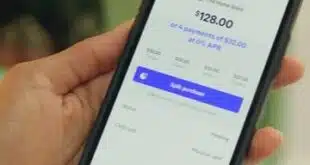An overwhelming risk-management burden, coupled with a lack of familiarity with consumer credit, may have triggered the decision at Goldman Sachs Group to negotiate a withdrawal from its agreement to support Apple Inc.’s credit card and its recently launched buy now, pay later service, according to observers. The Wall Street Journal reported Friday the firm was in talks with American Express Co. to take over its card ventures with Apple.
“It is no surprise to see Goldman Sachs looking to exit the card business, and the firm will find they are better off sticking to the world of securities,” notes Brian Riley, co-head of payments at Javelin Strategy & Research, in an email message to Digital Transactions News.
The risks involved in retail credit, a world largely unfamiliar to Wall Street firms, may have caught up with Goldman, Riley says. “Credit risk management requires discipline and strategy, which is where the [Goldman Sachs] card failed.” Goldman has been steadily retreating from retail banking, a business it entered in 2016. The company said in January it had lost more than $3 billion on the business over the previous two years.

Meanwhile, with cardholders’ loyalty fixed on Apple, not Goldman, the card proposition could have looked increasingly unappealing to the cobrand partner. “They may have figured their upside wasn’t so rosy and their potential downsides weren’t appealing,” says Eric Grover, principal at payments advisory Intrepid Ventures. Neither Goldman nor Apple responded to queries from Digital Transactions News regarding the WSJ’s report.
Other observers are even more blunt. “It’s clear that the product is … not performing as expected … and … is too expensive to manage profitably,” says Patricia Hewitt, principal at PG Research Advisory Services LLC, in an email message.
Goldman’s ventures with Apple include Apple Pay Later, a buy now, pay later product launched in March, along with the Apple Card, introduced in 2019. That product, made of metal instead of plastic, features a daily rewards payout. Unlike traditional plastic credit cards, it does not show either an account number or a card-verification value.
Apple Pay Later, which was originally set to appear six months earlier, represented the iPhone maker’s effort to tap into a fast-growing market for instant online and point-of-sale installment-payment services. The service runs on Mastercard Inc.’s network, with Goldman supplying a network token.
Now, the baton for Apple’s ventures in payments may pass to AmEx, if those talks bear fruit. AmEx did not respond to a call from Digital Transactions News. “The rumor of American Express picking up the relationship has promise,” says Riley. “American Express has decades of experience running excellent co-brands like Delta and Hilton. Still, AmEx is a disciplined lender and will not likely embrace high-risk account holders, even if Apple wants it.”
Riley points out that Apple may yet have other challenges to confront in its efforts to work with outside card partners. Before Goldman, the tech company had enlisted Barclaycard for its cobranded card efforts. “With Apple now on its third financial- service partner for their co-brand…[it] still has a few things to learn about consumer credit,” Riley says.
Other observers point out that potential partners for Apple’s payments ventures will confront the same challenges Goldman has had to deal with. “While I’m not privy to Goldman’s thinking, Apple is a demanding co-brand partner,” says Grover. “It likely captures the lion’s share of [the card’s] economics. Cardholders’ and borrowers’ loyalties and relationships are with Apple, not Goldman. Goldman has credit, and, in the current environment, increasing regulatory risk.”





